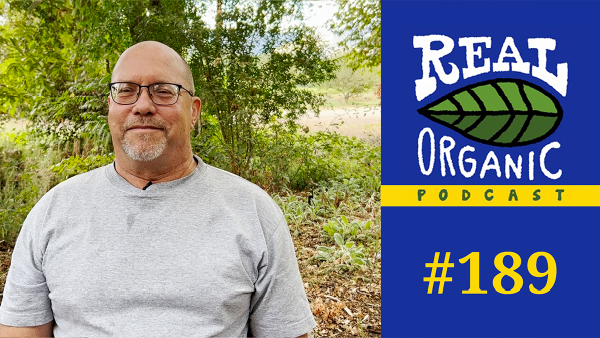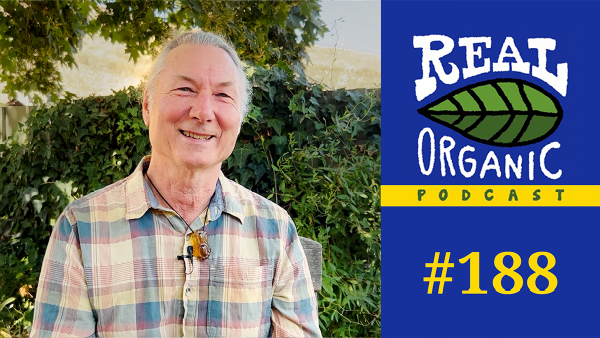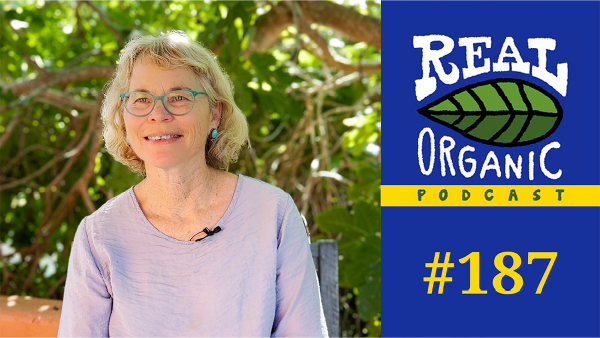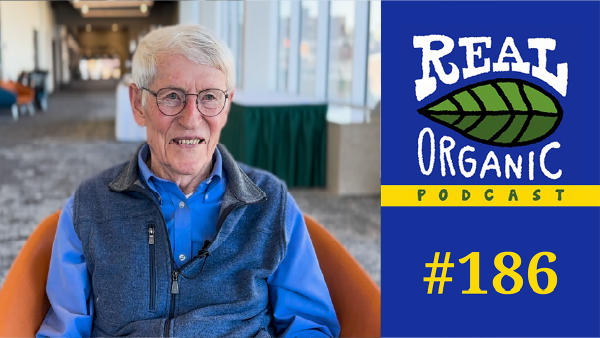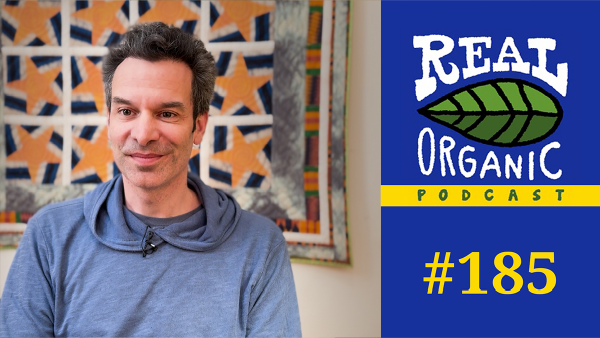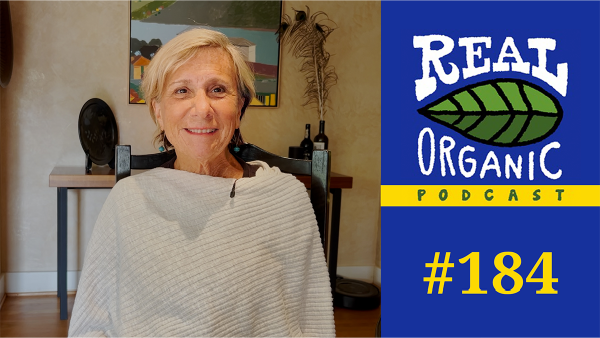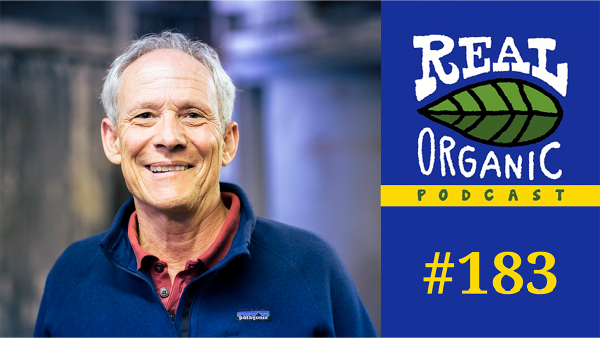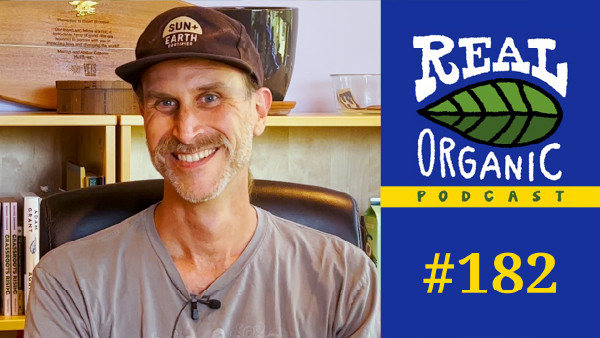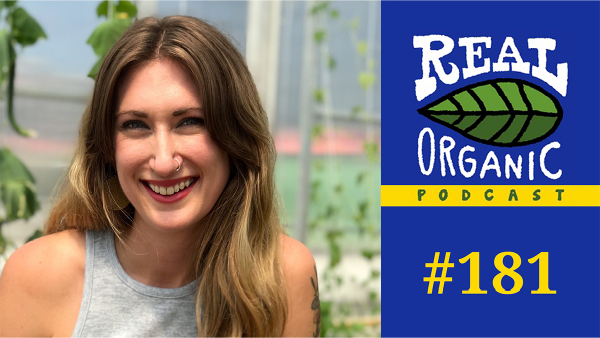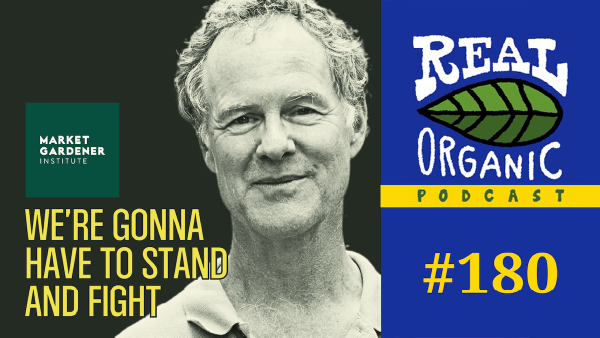Episode #190
Eliza Martin Daley: Teaching Food, Flavor, and Agriculture To Kids
Welcome! You can subscribe and download episodes of our show through your favorite podcast app.
You can also subscribe to receive the video version of each episode on our YouTube channel.
Our Eliza Daly interview has been edited and condensed for clarity.
Dave Chapman interviews Eliza Daly in California, January 2024:
Dave Chapman 0:00
Welcome to The Real Organic Podcast. Very pleased to be talking with Eliza Daly today. Eliza, thank you for taking this time. Eliza is a chef, and an educator. And you famously won a Beard award that I’ll let you talk about- James Beard award, and also, you won Chopped. I know a James Beard award is a huge thing, but people watch Chopped . So good. So Hi. Could you tell me a little bit about your food story?
Eliza Daly 0:42
Sure. I think my food story is a little bit different, but also very much the same as a lot of chefs that I’ve gotten the good pleasure of knowing. And food in my family was always a really big deal. When I was growing up my dad, he’s an army guy, very, like stoic man doesn’t have a lot to say. But when he would cook that was kind of His love language. So for me, food became this kind of artful way of saying that you care. And I grew up around that. We grew up in Lancaster, Pennsylvania, where a lot of different versions of food were happening. So my dad came from farm country, he was former Mennonite turned English. And so I think he valued good farm grown food, because that’s what he knew is what he grew up around. But, you know, we grew up in kind of like a middle class family, we couldn’t afford fancy meals all the time. And my dad would cook for us one night a week. And it was just magical. Like he would create these unbelievably intricate, beautiful dishes. That was like Saturday night feasting. And I don’t think I like valued it quite enough when I was a kid. But looking back and seeing all the care of preparation, there was something there that really sparked my curiosity. And getting to help him was like the greatest honor and the household was getting to create these dinners together. With my mom, she grew up with like a very boisterous Italian family. And so we would like to make pasta together once a year for Easter, we would make this beautiful ravioli dish, I remember like looking forward, I just the smell of pasta, can bring me home because it’s there’s something magical about being all together being loud giggling and creating this amazing food together. So I think just growing up in a family where food was really important and valued, kind of changed my perspective on what food could be. But I never set out to be a chef, I set out to be some sort of actress on the stage and was studying musical theater, decided to go study abroad in England and learn about Shakespeare. And that was the very first time that I actually got to cook for myself and, you know, living abroad by myself. These lovely flatmates sort of took me under their wing and decided everybody would teach me what like the new white girl would teach her one new thing. And so my Italian flatmate taught me how to make tiramisu. And my Australian flatmate taught me how to make jam. My Welsh flatmate taught me how to make a roast. And everybody kind of like took turns giving me a little bit of something. Unfortunately, we live right next door to Borough Market. So that was where I spent as much time when I wasn’t studying as possible. In that market, talking to these like cheese farmers and these incredible just these like market experts in England of all places, and that’s kind of what sparked it for me, I got to cook for myself for the first time, I had to feel the empowerment of what that would be like to actually make food all by myself for myself for my flatmates. And that was kind of it for me, I fell into foo or right after that I started working at the Rachael Ray show in New York City while I was still in college. When I graduated, I moved to New York still kind of like hanging on to the actor stream very quickly became a bartender. So all I would find myself doing would be like sneaking to the back of the restaurants. I was working as a bartender and hanging out with the chef and like making friends with the chef and asked me if I could watch or help out on my day off and that just sort of exploded. So I think, I think was about six months after moving to New York, I decided I’d become a culinary student. I had been taking these acting courses and was just not getting anywhere with any auditions. I was getting here. Usually frustrated with like what I thought art should be. And I decided I needed to go to culinary school I had had actually pitched an idea to somebody I met at one of the bars I worked at that there should be some sort of college centered food cooking show on the Food Network. And I had put together this whole ridiculous schematic of what this show could look like. And when I pitched it, he asked me if I actually knew how to cook. And when I said no, he said, I needed to get some skill sets. So I started culinary school right after that. And then it all kind of fell into this decade long pursuit of learning different styles of cuisine. So after I graduated culinary school, I worked in every restaurant or catering gig that would hire me, I decided I needed to learn as fast as possible. So in the back of my head, so I could pass on the information. I think that’s the whole reason I was trying so rapidly to absorb as much as I could from every chef that I met, so that I could eventually pass it on.
Dave Chapman 6:06
Pass it on. You were, you’re already thinking that you wanted to share it to cater. Yeah,
Eliza Daly 6:13
I think it’s ridiculous that I went to culinary school. And it was the first time somebody taught me how to pick up a knife like this, this skill set that I found so empowering, when I was studying abroad should be part of the everyday education we give to anybody, I think in this country. But I was shocked that I knew so little. And the more I learned, the more I learned how little I knew. And that’s why food was so impressive to me, it was something that could keep me always curious, it could keep me always creating, because you just, I can never learn it all. That’s what makes it so interesting. But I also think that these skill sets are just simple muscle memory that can be built in any way. And I truly believe that anyone can cook, because I learned how to do it. And if I can learn how to do it, anybody can learn how to do it. But I think that something in me was still trying to get to that that teacher, part of me trying to figure out new ways to do things, so that I could share them because I would go to culinary school and immediately come home and start cooking more just to see if I could get it faster, better. And then share with my roommates and you know, living in New York, you have 45 roommates at a time. So there’s a lot of people to feed practice. So once I graduated culinary school, I started working my first restaurant, I was working in a catering three catering companies. And I applied for this James Beard Award Competition. And it was a complete fluke, I had no idea what I was doing or what I signed up for. But I ended up winning this competition, and it was called the women and culinary Leadership Program. And that was basically at that time, this was in 2012 3% of the executive chefs in our country were women. And so they were trying really hard to push more females into the limelight and get them into more of these like management positions. So I I won this really amazing award, I got to move to Chicago, and I got to cook Indian food for a whole year. And learn the ins and outs of running a restaurant kind of from the top down, I worked as the sous chef I worked as the manager I worked as the front of house ever to the back of house, there were nights when I would sometimes fly from the tables, taking orders back into the kitchen, prepare the food that they had just requested and then bring it back out again. So an interesting experience. And then from there, I just had more experience learning that I love teaching. So I was the only one patient enough to train the new cooks coming into the restaurant at that time. And I learned I really loved that I loved being able to like share and coach and and try to get somebody more in touch with their hands. And so after that, Chicago was kind of like my playing field, I got to play in Indian food. I got to work at a a nonprofit Restaurant Group that served homeless trying to get more people working on the line who were not well off. Because the food industry is a place where a lot of people who may not necessarily have you know, an amazing skill set can go the food. The food industry is kind of a a place for a lot of different people collect so that was pretty awesome. I got to work in that restaurant for a year making Creole food teaching people anywhere from age 19 up through 55 How to Become a line cook or prep cook I’m I was hard work. But I also started seeing the like the discrepancy, the differences in people’s backgrounds and their food knowledge and how I had grown up. Like, thankfully, in farm country, I knew what a tomato look like I knew what a cucumber looks like, I remember sending one of these, these line cooks, I was training to the pantry to grab a watermelon. And they didn’t know what it looked like they came back and asked, it’s not the one that’s in the soda, right? Like, what I’m looking for a watermelon. And I had to actually, you know, physically train these adults what, what our fresh food was. That was mind blowing to me. And I think I started to put together some more pieces of what and how some education had kind of failed. This and this was still in Chicago, this is in South Side Chicago, difficult part of town. And so from there, I felt like I just needed to teach complete the full time and given to teaching the next generation. So I started working in a children’s culinary school. I started my own catering company, I started my own aquaponic farming company because I I felt like students needed to actually see food growing. And so we were building these tabletop like gold. This is so ridiculous goldfish. aquaponic systems, so the kids could see kale growing or could see basil growing. And we hit a lot of roadblocks with that the FDA wouldn’t allow students to eat the food that they were growing. And so they could watch it grow, but they couldn’t taste it. So a lot more came up for me understanding how and what needed to be passed on in education. And that’s when I got the call to move to San Francisco and take over a restaurant there. So I got back on my chef coat started running an Italian restaurant in San Francisco. And that was amazing. Going back to my Italian roots, getting a cook really beautiful Italian food with an amazing team. But I still started missing the teaching component. And so I started organizing with another nonprofit in San Francisco, cooking classes for kids right out of the restaurant. My poor servers were mortified when I started doing that there was flour in every part of the dining room. But I just kind of I started to realize that I I couldn’t be at home just in a restaurant I needed to I needed to continue to teach. So I worked with another children and adults culinary school in San Francisco. And that’s when pandemic hits. So we moved to San Diego and now I just craft as many school programs as possible around food and culinary training.
Dave Chapman 12:58
In a lot of ways, so yeah, tell me what, what are you trying to teach the kids? I mean, obviously, to know what a watermelon looks like. Right? But But Greg? What are the kids come in? I mean, are you just trying to teach them how to make a meal.
Eliza Daly 13:14
We started there when I started teaching, especially with younger students. So I run elementary, middle school, high school and now community college level classes. And when I’m teaching them how to cook, I think the first step is much like Alice Waters with this Montessori style teaching is using our senses and getting in touch with our five senses. What does that look like? What is it? What does tomato growing on the vine smell like? Tastes like? What colors does it have? How does it suggest that I should pick it right now? And what could it be changed into? How can we creatively make this something else? What does it feel like? So we use a lot of the five senses kind of in the beginning. With especially younger children, I run a garden program at an elementary school we harvest out of the garden, they get to cook for themselves what they’ve harvested. That’s rad. But it’s so much more than that to me, and I tell all my students that I don’t I don’t need any of them to become Gordon Ramsay. I don’t mean to be celebrity chefs, but I need them to be empowered with food knowledge. I need them to be able to share this with their families. Because we’re in this kind of weird we’re in this weird place right now where my generation the Generation ahead of me my parents generation. We lost something along the line and getting in touch with our kitchens It suddenly became I’m not I’m not sure if it became like less cool to be in the kitchen or if it became a little bit. Just not it wasn’t a priority. Making food became this thing where it had to be fast it had to be I’m completely available all the time, and we sort of lost the joy of cooking. I think we also really lost the importance of cooking, and the value you can have and not just using your two hands, but being able to choose what you’re feeding yourself, your family, the nutritional value that’s behind all of that, it became so much easier, I guess, just to grab food on the go fast food became kind of the norm. And a lot of the students I work with are at risk youth or kids who have grown up in either a food desert or grown up around food insecurity. And so the way food is observed and understood is just very, very different. I think, especially than I grew up around in Lancaster, Pennsylvania, where you’re surrounded by farm country, you’re surrounded by farmers who are getting to know the land and, you know, different styles of cuisine. That I think, for me, I’m trying, in some wild way, my goal is a domino effect, I’m hoping that if I can pass on to a child, they can pass it on to their family, and bring the value of cooking together home. Some of my training, some of the training that I run is for job training, because for these at risk youth I work with in high schools, they they don’t have a clear path of what their career can look like. And food industry work is something they not only have a knack for, but they also could easily get involved with as you know, the start of their career path. California is actually the number one state this is ridiculous to me, the number one state that horse, the most youthful are homeless, so we messed up some way. But I also think that this like food, this food knowledge, is one that is very, very empowering to to kids who are still kind of figuring out how their brains work how their hands work, this knowledge unlocks a lot more than just getting a good meal on the table. It helps them to get in touch with their taste their sense of smell their visceral learning. So it does so much more than just gives them an awesome meal. It is It empowers them, it gives them something to be proud of it gives them a creative outlet. So to be I mean, this training is a lot of things. It’s a lot of therapy for some students, it in some cases with some of the elementary students I serve. Those are kids who didn’t get breakfast at home. So it might be one wholesome meal, they’ll get that day. It’s It’s It’s way bigger than just just cooking. It’s so much broader. I have a very great fear that if chefs like me, chefs who, who have gone through culinary school don’t pass on this knowledge. I’m very scared that nobody will because of the dramatic cuts we’ve seen in school budgeting for providing things like nutritional education. We used to call it home neck when I was in high school, but that doesn’t exist. It rarely exists in schools anymore. So I think that it’s a measurable value that these students get from learning about food, getting in touch with food, where it comes from, how they can use it, how they can create it, how they can nourish themselves with it. I’m very scared I really genuinely have Vir every day when I wake up if I don’t do this who will like I think we have to look to these community leaders to do it was our best friends
Eliza Daly 19:08
they agree to I mean really getting support here I’m serious though. I’ve really the whole reason I took the leap out of restaurant world is just because I feel like as has experts in in our fields chefs have to be the ones to pass on this knowledge and if we don’t appear to be SOL
Dave Chapman 19:34
you know, there’s an interesting thing and certainly many people observe it, which is these phenomenal chefs. People who have this high art of cooking are often only able to cook for people of great means. It’s it’s who can afford to to go and eat at at these amazing restaurants and I’ve eaten at some of these amazing restaurants, usually as the guest Yeah, and but but you know, and it’s remarkable and honestly, most Americans, many Americans eat the majority of their meals in, in fast food restaurants. And I would save all of my restaurant budget and go to one meal a year, to just have something that is maybe changes your mind a little bit about everything. But it is a conundrum of, of how do we take this kind of wonderful, brilliant thing that used to be part of home life? It used to be that you learn how to cook at home. Yeah. And and you, you know, you cook for your family. Yeah. And that doesn’t really happen. As much
Eliza Daly 20:46
value of that has disappeared. And I guess I I think I might be honestly too young to pinpoint why that happened. Because I know it happened a generation before mine. Since I didn’t grow up, you know, in the kitchen, learning how to do all of that. I think the important things. A lot of my students, somebody’s their grandmothers, are there ones teaching them how to how to cook, which is awesome, beautiful. But I wonder the why of that is interesting to me. I’m sure it’s different for different demographics. But why it became so much less valuable to use our hands, why is not valued in schools? Why aren’t we learning how to do these? Learning about these soft skills, learning about how to use our hands? I don’t know where that went out the window. But I definitely think we did a disservice to the next generation. And in thinking that arithmetic is important, but learning how to feed yourself isn’t. That’s crazy. That’s crazy. We have to figure out how to nourish ourselves in some way. Hopefully do it deliciously. But we have to figure out how to nourish ourselves in some way. And we’re not equipping students with the tools they need to survive, like how did I leave college and only know how to cook scrambled eggs. That’s, that’s bonkers. I should not be going into adulthood. Not being able to feed myself. Well. I’m, I hardly even knew what food could look like until I started culinary school. My food curiosity had always been very, you know, vast. But I grew up in Amish country, Pennsylvania, where there aren’t a whole lot of Japanese or Thai. You know, I have found that when you get kids interested in using their hands and give them choices about what it is they’re making and creating, they are so much more willing to explore their curiosity gets pert just that quickly, just an offering them an option to garnish with a little bit of basil or parsley make a choice. And then they you know, the next time around feel a little bit more brave about what it is they’re eating and trying. So I don’t know, man, I don’t know the exact way to fix this. I just know I have I have to do something I can do a part of fixing it. I would love to see every single school providing culinary education, not just to become a chef, do become a human to become an adult who is equipped to take on the world. Because you have to know how to buy groceries and budget and you have to know how to pick up a skillet and create something for yourself. It doesn’t have to be hard. It has to be accessible. And I think that education is really really important. I believe we’ve really failed in giving the next generation needs these essential tools to to feed themselves well eat with the seasons create something really beautiful on their own.
Dave Chapman 24:07
You know, I also grew up in Lancaster County. And I was the generation where it probably happened.
Eliza Daly 24:16
What happened?
Dave Chapman 24:17
What did we do? I actually remember the malls being built when I was when I was born. McDonald’s didn’t exist. Right? It didn’t exist. It hadn’t hadn’t been born yet. Walmart, you know, hadn’t been born yet when I was born. And in in my lifetime. It’s gone from first one and then two stores to being the biggest food purveyor in the world. Right? It is the biggest and McDonald’s has become you know, the biggest restaurant chain in the world. So something happened in my lifetime is very quick. By the time you were born. It was already well underway, and you didn’t see it. An alternative to it in the world around you. I think there was a lot of money to be made by, by doing that, that consolidation. And so I think there’s a reason that people aren’t being taught how to cook in school anymore, which, which they were when I was a kid, there was home at class, there was also shop class, and you would learn how to make stuff. I’m guessing that the reasons were economic. And, and that goes both ways. There’s a, there’s a thing that said that people don’t have time to cook anymore. And I, you know, I’m trying to understand that because there certainly were people with not much money when I was a kid. So they also didn’t have time and yet they did cook. Do you ever do you have any thoughts about that about why cooking, preparing food has become so disrespected? You know, it’s, it’s, it seems that it’s not valued. It used to be valued, and it is valued. If you’re in a light table, tablecloth restaurant, right? It’s like very valued, and chefs are our cultural heroes.
Eliza Daly 26:17
So funny, I think, I think two things happened, or at least maybe my understanding of it is that two things happened. We invented the Food Network. Chef’s, I don’t think until really Julia Child and Anthony Bourdain came along to chess weren’t cool. I mean, they were honored, but they weren’t cool. And they weren’t. These kind of like heroic badass is now there. Now, it’s an amazing thing to be able to sort of, you have become a chef. And you you know, you wear that on your like you’re tattooed up and you’re ready to rock and, and I love all that. I think it’s so cool. Because forever being a chef is a hard job. And they should be lauded and honored. I can tell you terrible stories about how difficult difficult it is to work in a restaurant. There’s a lot of glory there for sure, and a lot of gore. But I think something happened to the consumer, watching chefs on a screen, compete and create so much that it became this like dramatic break, we now think we can’t achieve that it’s too glamorous, is too wild. It’s too Hollywood. Like I don’t know, we just can’t I as just a normal person can’t possibly cook. That’s what the chef’s on TV do, I couldn’t possibly do that. And so we’ve separated ourselves from the kitchen at a time when convenience is also kind of like King. So we’re trying to also gain all this time back for ourselves. I’m a big believer that the time we put into our kitchen now actually gives you added years at the end of your life because you’re making choices about nourishing your body. But that’s another story. I think, for me, you know, I got wonderbread might be the the thing that ruins like having TV dinners might be the thing that that changed it for us because it was suddenly easier just to do it the fast way that inexpensive way and the value of convenience, outweigh the value of nourishment and and health even maybe. I don’t think it was that way. For me growing up. I was lucky. And even on a small budget, we could create pretty tasty food or my vase gives at least a casserole that she made. But I don’t know, I think I think there’s there’s probably a lot working in tandem, that created this idea that the kitchen was a scary place. And that you know, making a mess wasn’t okay. And convenience was all that we cared about, you know. And in this like racing technology time I see it a lot with the students I work with like oh no, they’ll cook in my class. And I’ll ask them if they’ll make it again at home like do you think you’ll you’ll create this again, like over the weekend? Oh, no, I don’t have time. And something has to change, to be able to get that switch to start to really value what it means to cook for yourself on on so many levels. Not just be able to be creative, but taking care of yourself like the practice of cooking can really be transformative and people’s health and their well being. And in mental sanity. There’s so many different ways that food can be done. transformative. And I just can’t, I just can’t believe we’re not teaching any of it to the next generation. And that’s where my fear stems from is if if chefs don’t pass on this knowledge, who’s who’s going to pass it on, because now we’re kind of the only the bastions, you can carry this on, right? We’re the only ones who have this expertise,
Dave Chapman 30:25
and respect. For now, chefs are respectful or farmers. Farmers are also Yeah, cultural icons and chefs. And when a farmer or a chef gets up, people actually tend to listen, we just have some kind of a platform, and I say, we need to use that we need to use the microphone that’s been offered to us, people right now are outsourcing the preparation of food right to somebody else someplace else.
Eliza Daly 30:53
And I get it, because, you know, I have friends who do that, I totally can appreciate that the difficulty, the fear that comes along with trying to learn the craft of cooking, which should be a part of our education growing up, not just in the home, I really believe in the school system, we need to be, we need to be giving the next generation because I missed it, the boat, but the next generation at least needs to be learning how to use their hands to be able to feed themselves healthfully and, and that’s going to be the transforming factor that brings, I don’t know, the next wave of, of what farms can look like, of what food can look like. And I can appreciate how difficult it is, if you’ve never been shown or never understood how to cook, it’s scary. It can be terrifying to you know, figure out what you’re going to make for dinner for your, your for person household. But we’ve got to get value back into it so that things can change. If, if the, you know, moderate consumer can can make that change for our farmers for our restaurant tours who are trying to create something beautiful. I mean, I’m no I’m I know that food costs are outrageous and insane right now. And that makes it even more difficult for a small restaurant or or somebody trying to feed their family like something’s gotta give, we’ve got a Yeah, value this more?
Dave Chapman 32:34
Well, you know, fast food expenses are pretty out of control to sell like this cheap anymore. Right? You know? Yeah, there’s an addiction there. Yeah, there’s a cultural addiction, it’s, we don’t see the art of the possible that’s what you’re doing is creating an alternative? What? Let’s turn for a minute to that. You know, a lot of farmers listen to this podcast. So let’s talk about the raw materials of cooking. And the impact of that. There’s a, we know a carrot is not a carrot. Potato is not a potato. We’ve they’ve tested this, because zillion ways in the gazillion years. And they’ve seen a steady decline in the nutritional value of basic raw foodstuffs over the last 40 years. Yeah,
Eliza Daly 33:26
again, because of convenience. We’re trying to make so much to feed that. It’s just Yeah, I don’t I
Dave Chapman 33:35
quicker, faster, cheaper. Yeah, but it’s not really cheaper, if it makes you sick isn’t. So I mean, that, you know, those, those nutritional elements that are missing are important to us important to our health. So I’m just curious,
Eliza Daly 33:51
as important as are they, like, we’re not making them important. It shouldn’t be important, but we’re not coaching it. We’re not teaching that that is valuable. That’s crazy. How there’s no other way to make it better, unless we’re actually passing on this knowledge unless we’re, we’re starting to value. Our health directly stems from what what we eat, right? And we’re not teaching that what we eat can come from something beautiful for us learning and I’ve watched it with my own students. We’re learning that food comes from the grocery store. Apart from that, we don’t know anything else about it. Right? Like the what’s been done to it, we don’t know what chemicals it’s gotten rubbed all over it. We don’t know. You know, even getting my high school students to associate the animal with what we’re cooking, and getting them to understand like what a chicken is before We’ve gotten it packaged at the grocery store, what a what eggs look like, when they’re fresh and what what a pig looks like on a pig. You know, it’s it’s there’s a gap there, huge
Dave Chapman 35:14
gap. I heard Emanuel furbearer was quoting a study, I don’t remember the details, it was something like 10% of Americans believed that chocolate milk came from Brown cows. staggering number, you know, so Okay. And this is true for the Real Organic Project to our, her biggest challenge is actually educational. There actually are a lot of farmers who know how to grow Real Organic food, food. And there are actually a lot of people, millions of people who want to buy that food, but they can’t necessarily, they aren’t necessarily getting with what they’re trying to buy. But you’re talking about one step removed with like people for whom it doesn’t necessarily occur to them, that they could buy food and prepare dinner with that,
Eliza Daly 36:08
right. I mean, I am a huge supporter of local farmers and support. As a community, I think it’s our job to support the most local food that we can get, for the students I serve. We’re just still trying to walk before we can run, we’re just trying to get students engaged with what food is and looks like in its raw form, when we grow it, when we purchase it from a farmers market or a grocery store, and then how we can play with it and make it something delicious, that they’ll enjoy. You know. So I think I think the entire organic movement could be and the slow food movement, and I feel like we could completely influence that with this next generation, just by getting them engaged and interested in where their food comes from. And not just interested in valuing what food is, what a meal is, and what that should look like, not just what they’re I forget on a whole platform on the fight I’ve had with the FDA about what shows up in school lunches, and we’re not really doing a good job of teaching kids what healthy food looks like, or, you know. So it’s it’s tricky business, I really think the only the only thing that is going to make a difference is education. And it’s a very difficult thing to do with so many people in our country facing food insecurity. I think it’s something like 45 million people in our country, face food insecurity, meaning they’re not even able to afford food for their family. Like, ah, we’ve got to do something to change it as just, it’s it, I really think it has to start with educational systems, primarily public education, because students at affluent schools in affluent families are going to grow up naturally around different styles of cuisine and naturally kind of have that food curiosity. That’s what we’re seeing is that you have right that we have to have more money to be able to afford this organic lifestyle. That’s the consumption right now. And we’re not teaching that we if we eat seasonally, if we eat what’s already in season, we could afford some of these foods. There’s any we live in California, where there’s any number of foods available in the correct season that my students don’t recognize. They don’t know they don’t they can’t recognize it unless I’ve shown them. Here’s what a kumquat looks like. And here’s the tree it grew off of. They’ve never tried it before. California students. That’s why I’m mad. That’s why I’m frustrated. I don’t know who else can can teach this but I really believe that community members should be engaged in in creating better learning for the next generation. I’m a full believer that there should be a chef at every school teaching how to make food properly. There should be a farmer at every school, teaching how to grow properly. There should be health experts at every school, you know, the doctor should come in and share what nutrition looks like. I think that should be the way of our educational systems growth. But until we get there. Keep keep hoping that students pass on this knowledge to their families. You
Dave Chapman 40:02
I want to come back. But I want to take one break. And I want you to describe because you have described it to me the experience of being on Chopped this TV show for people who don’t know what that is. Yeah. And it’s a competition. And and, you know, the competition of the judges vote. I think it’s three people who are in for every round four people in for every round. And, you know, by the end, they pick a winner. And it’s a very engaging and entertaining thing. And it takes How long is the show?
Eliza Daly 40:34
The show when it’s aired is usually about 30 minutes, 30 minutes on time was 16 or 17 hours. Exactly.
Dave Chapman 40:41
So So could you because it’s pretty interesting. Could you talk about what it’s like for the 16 or 17 hours that it was being filmed as opposed to the 30 minutes that we saw for great entertainment?
Eliza Daly 40:52
It is all entertaining, isn’t it? That’s another part of the separation, we see it as entertainment instead of something valuable. I went on, I auditioned for the Food Network’s chopped series for two reasons. Number one, because because I went through the James Beard Foundation’s women in culinary Leadership Program, the Food Network started looking for more females to be on camera, there weren’t enough ladies being represented as chefs. And so while I was running my restaurants, San Francisco, the Food Network kind of reached out directly and so I got an audition and do the whole thing. And that was like a whole taping process done in San Francisco as our little audition tape. And then the producer said, Yes, I went to New York for a day. And starting at like, 5am, we were in the studio. And I I actually did that show. I have my impetus was to do that, just so I could be cool for my students, like I just wanted to be something that they could see as a real chef. Because until you make it on the screen, I don’t think for some reason here. I mean, isn’t that silly, but that’s sort of like the thing you have to do to be impressive. So I did it. And there’s four competitors, and every course of a meal. There’s another competitor, who’s kicked off. So I went through the four courses and was very grateful to win. But in between all of that, I mean, it’s such a, I think they do a really good job of writing a story around each one of us. There were moments when I felt like I was trying, like, I was being fed lines that I was supposed to say out loud, like who I thought should be kicked off or who I thought the worst person was. And I just sort of decidedly refused. I just said, like, I’m not going to repeat anything that you’re saying. I think everybody’s great. And we’re all doing a great job. But there’s 16 hours basically, or getting the kitchen set up and beautiful in the studio space. We got to cook, every single one of us made an abysmal mess that they had to clean up afterwards, which definitely took at least an hour. And then we would come on for the next round. And then in between each of the cooking challenges. We’d have to share with the judges what we created, they would eat our food. Usually it had gotten cold by that point because it took a full hour to get through all the criticism. We measured up to a greenroom. Come back and do it all over again. Yeah, I think I think it was a wild ride. I had a great time, I had a really wonderful group of chefs I got to cook with and learn from. I was the youngest by far and just really got to enjoy hanging out with some other cool chefs from all over the country. And I think I did a little bit of preparation for myself, because I know myself under pressure and have to feel like I’ve prepared in order to do well. So I felt like I studied different ingredients and decided if I saw mushrooms and I would definitely make this dish which meant this style of cuisine and I’m lucky enough to have a lot of weird stuff to pull from I had Indian food and Mexican food and Thai food and I’ve worked in all these different styles of cuisines. So I had to focus my brain a little bit on what would be created if I saw XYZ. So I didn’t go all over the map. Yeah, it was great. And the chef money who was one of the judges. She was the former executive chef of the restaurant I took over through the James Beard Foundation. When I did my women and culinary leadership program she ran An Indian restaurant I would then enter into after she had left. So the whole thing got kicked off with me cooking one of her dishes for her was really kind of gone. one of two ways it could have been a terrible idea, but it worked in my favor. And yeah, I think just like, with anything, if you can tell a story about a dish, if you have a story behind it, then there’s a little bit of magic there. And that’s what I did. I wild day, but as a lot of fun. Well,
Dave Chapman 45:38
it was an exciting 30 minutes. And it was it was, and I would just like to tell everyone, you were like the only one of the three finalists who didn’t cut herself. I know, as you’re flying
Eliza Daly 45:50
over that everybody everybody was giving me bad, you know, criticism on my knife skills. I’m only when kept all my digits attached.
Dave Chapman 45:59
Okay, okay, so. So tell me a story about if you were, you know, the ruler of the universe, and you saw that with the proper resources. You could change the food system. Well, what would you do?
Eliza Daly 46:24
Oh, my goodness, there’s so much work to be done. Globally, have a global control just here? Well,
Dave Chapman 46:35
I was gonna start with the US. But if you’d like, to planetary, that’s good.
Eliza Daly 46:41
Let’s start with us. I think
Eliza Daly 46:52
I think the, the most important thing that we can honestly do is start valuing food and culinary education. At every level of education, every public school is required to have nutrition education. But that does not amount to any sort of skill set. With like a tangible result, there’s no way to test a student’s learning on how healthily they eat, they have to physically be shown how how to start, you know, we have to, we have to be giving the next generation a semblance of an idea of how to actually create the food, we’re trying to teach them as nutritious. And I think that it’s going to start with that. And it will gradually progress to the next generation, demanding higher quality produce and more nutritious, produce healthier cattle that we are eating healthy. I think it’s a small drop in the water, but it’s going to be transformative if we can just start empowering the next generation with smart food choices. And what does that mean, there’s so many different varying ideas of what that means. But what will nourish my body most is going to be I think, as we all already have talked about what’s growing seasonally, and what’s growing? Well for farmers, so things that are grown with care, and packed full of nutrients, I think it’s like you said already, there’s foods that are grown well, and then there’s foods that are grown for vast quantities. So the only way that the system can change is if there’s demand for it, and we can’t get a demand for it until we start putting value into it. And the only way we will get value from any of that is by coaching the next generation about what that looks like. Even just opening their eyes to some of this is amazing. I remember doing a high school q&a At my old at my alma mater, my high school back in Lancaster, Pennsylvania. And it was the first time I think every single one of the students had seen tofu like they had no idea what it was or why they were eating this weird spongy thing when I give them miso soup. I thought that was not a novelty. That just if I could change any of it, it would just be too dark enacting at a federal level. Food courses in every single school And I think part of that may even help with some of these, these food deserts that we see in all all over our country. And these, these kids who are really struggling because of their lack of delicious food at home, we could kind of kill two birds with one stone, they could be cooking a nutritious meal for themselves. That’s, that’s free lunch, you know, we could be giving them food that was not just brown, full of nutrients. And they could be learning how to do it themselves. But there has to be a value there. There has to be. There has to be a normalcy about that. And then a demand for that. To change anything, I think, yeah, I don’t know what you’re seeing on your lines with running all these farms. The demand right now is coming from I think, people who are very well off people who can afford to have all these amazing flavor profiles and want only the highest quality, and people are educated enough to know what the value is really nutritious. Good. And then the rest are just kind of falling by the wayside because they don’t know any better. So until we invest in that education, I don’t I don’t know what change will be made at large, right until it’s valuable. By everybody is just going to be this high commodity beautiful thing that I’m lucky enough to enjoy, but my students definitely aren’t. So I don’t know, I don’t I’m gonna have to become president. I don’t know. Else. I don’t know what else to do.
Dave Chapman 51:51
I think it might need to be queen. I’m not sure the President has the power. You know? Yeah, certainly the President has a lot of power. But it’s interesting to think about what would it take to make, make what you’ve suggested, come true. Obviously, you start in your way, I started my way, we’re all on this grassroots way. And maybe maybe the grass will spread. That’s what routes do. And and it becomes, you know, a field and, and then a savanna. But the enormity of the system that likes things the way they are, this is pretty powerful. Well,
Eliza Daly 52:31
in the end, what we have in place is working, right? So at schools where the FDA allows so much amount of blue plastic to show up in the burger patties that are going on kids cafeteria trays, like I guess that’s working because kids are getting free lunch. But the nutritional value there is abysmal. Having potatoes in a fried form, count as a vegetable for these kids is not ideal. That’s I can’t even and they say we want to throw up I believe that is what we’re saying is okay, to give a child I’ve watched my student my elementary students, because I’m setting up in the morning in our garden space to cook this beautiful, whatever, vegetable inspired soup or pasta or whatever they might be creating from the garden. I don’t watch them go into the cafeteria and come out with chocolate doughnuts as their breakfast food. That’s what’s allowed to be given out as breakfast food. Trying to hit the roof. I just don’t understand how we’re not all up in arms about this. We’re developing kids who are going to be obese and have diabetes from a very young age, just because this is all the it’s normal. So it’s comfortable. And that’s what gets normalized and what they’ll continue to develop and have habits around.
Dave Chapman 53:58
Yeah, we create these new cultural norms that are very destructive, but they become a norm and so it’s what we know and in fact it’s even where we go for comfort. Yeah, it’s when we feel anxious. We go get the chocolate doughnut if that’s what we know. Yeah, yeah, it is.
Eliza Daly 54:19
It is so disappointing to me that we we put kids through that how I don’t know how we can all stand by and let that happen. Giving malnutrition as the checkbox that everything’s okay. Like I am sweating. I’m so angry about it all. I’m so upset. And I I don’t even have children yet. God like helped me when that happens because I am just going to unleash a fury But I just am so frustrated with the values that we’re, we’re giving this educational system? Like, I don’t know, I cannot believe that every parent isn’t up in arms. But they also weren’t granted the gift of knowledge that I think I was. And I paid for culinary school. So we got to fix it somehow.
Dave Chapman 55:29
Yeah. All right. All right. No, no, no, I agree. We
Eliza Daly 55:37
do it. I’ll tell you chefs can start passing on this knowledge. I really think that there’s this a special thing happening here. What I’m working on is getting my students involved with local restaurants. And so I take them on field trips, and they get to see how cool it is to be a chef on the line at a sushi restaurant run by one of my very dear friends, who also happens to have a parking lot he turned into a garden that he’s harvesting from to make this restaurant incredible. And getting these like local community members involved in the educational system, people who are experts in this field involved in getting kids excited about it is going to make all the difference. And it’s going to ultimately support that local restaurant to those kids, they’re going to go back and be like, this is where I went for that field trip. You know, we could be doing that and market set at farms. I think that that I think that’s the way of the future if I had my queendom and I would make our edge educational system completely transformed and start valuing, you know, the local community upholding it to higher standards than what we do now.
Dave Chapman 56:51
All right, Eliza, thank you so much. It’s time to go make some pizza. I have been fed by Elijah. It’s a great privilege. It’s a great pleasure. So thank you for talking.
Eliza Daly 57:06
My pleasure. Thank you. Thank you for caring about this. And thank you for getting the word out how we can make a difference.


